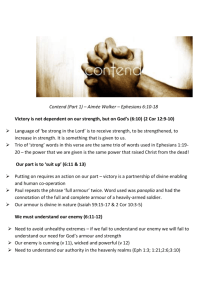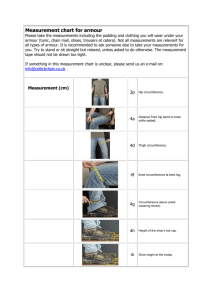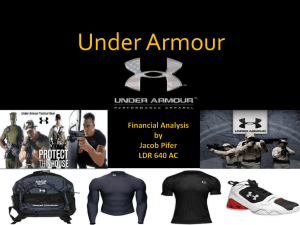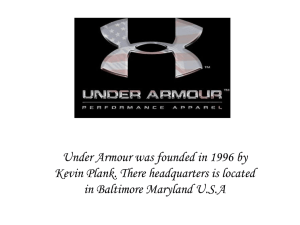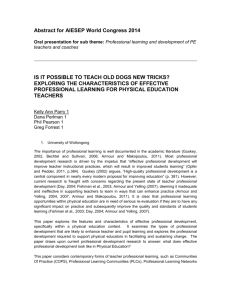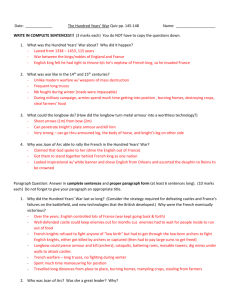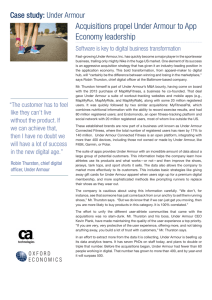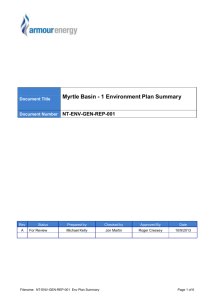Under Armour 1 Under Armour Case Study Jason Miller West
advertisement
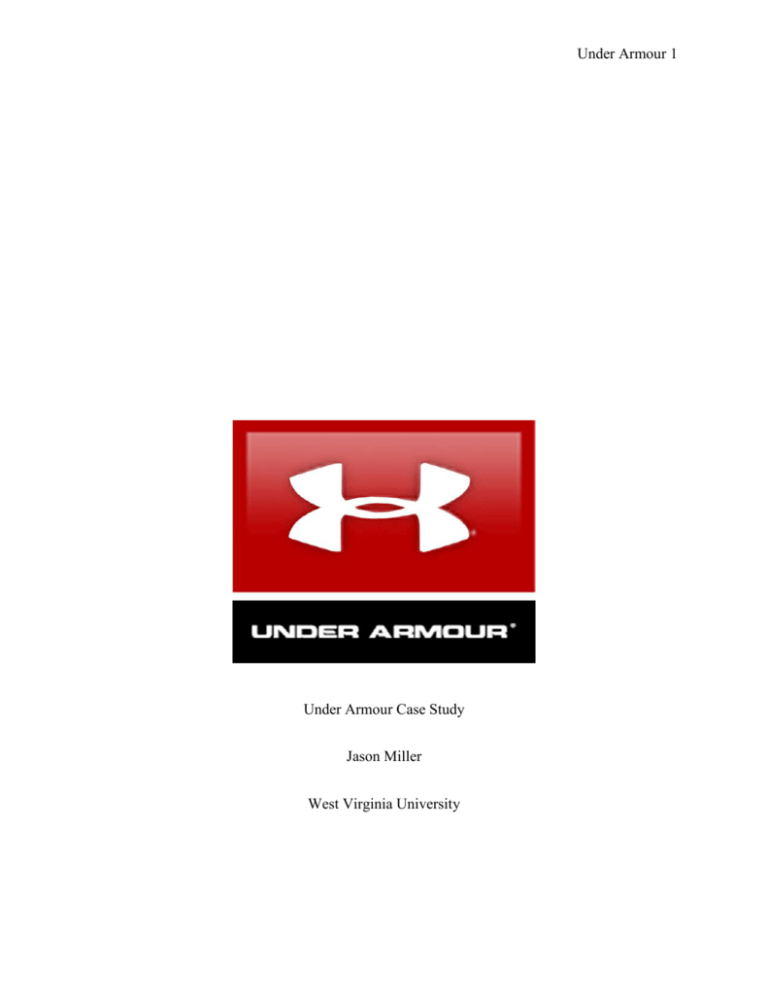
Under Armour 1 Under Armour Case Study Jason Miller West Virginia University Under Armour 2 Executive Summary: The beginning of 2009 meant a new beginning for Under Armour. This new beginning brought the Under Armour product line full circle with the addition of a line of running shoes. “We're dead set on becoming the world's No. 1 performance brand and running is a part of that," said Steve Battista, senior vice president of brand at Under Amour (A.P., 2009). Under Armour had the following to say in a press release dated December 8, 2008: “UA Run footwear launches at retail on January 31, 2009 and includes four road shoes: the UA Apparition™, UA Illusion™, UA Revenant™, and UA Spectre™, and two trail shoes: the UA Chimera™ and UA Mirage™. Each shoe is specifically engineered to maximize the performance of today's generation of professional, collegiate, high school and amateur athletes who are running as a sport or incorporating running as an essential component in their training regimen” (uabiz.com, 2008). Under Armour wants to provide a superior running shoe for all athletes that aligns with the current brand positioning of UAs other products which is performance and authenticity. “The foundation of Under Armour's first-ever running footwear collection is the company's new proprietary technology called Cartilage™. “The independent suspension system serves as the "connective tissue" between a runner and his environment to enhance performance and provide an exceptionally stable and smooth ride.” (uabiz.com, 2009) The marketing campaign for the new running shoe highlights the performance of the running shoes and attempts to show superiority to other brands along the usual authenticity that comes with all Under Amour offerings. The performance of the new running shoe is the major strength that the marketing campaign will focus on. Under Armour 3 Under Armour will be competing with Nike, Adidas, Reebok, Puma, and other running shoe manufacturers. The challenges that Under Armour and all of its competitors face are stiff competition from one another and very high expectations from current and potential customers. In order for Under Armour to continue its success with the new running shoe line and to rise above the competition in a new product line, it must plan and execute an effective IMC plan. Company Overview “Founded in 1996 by former University of Maryland football player Kevin Plank, Under Armour is the originator of performance apparel - gear engineered to keep athletes cool, dry and light throughout the course of a game, practice or workout. The technology behind Under Armour's diverse product assortment for men, women and youth is complex, but the program for reaping the benefits is simple: wear HeatGear® when it's hot, ColdGear® when it's cold, and AllSeasonGear® between the extremes. Under Armour's mission is to provide the world with technically advanced products engineered with our superior fabric construction, exclusive moisture management, and proven innovation. Every Under Armour product is doing something for you; it's making you better” (aubiz.com, 2009). The Under Armour brand is positioned as the highest quality and best available. Under Armour is advertised as higher quality thus demanding higher price points. The running shoe line will be marketed to adhere to the Under Armour brand position of quality and innovation. Under Armour founder and CEO Kevin Plank says “Athletes do Run” and “We will make the athletes better runners” (Plank, K., 2009). This is the foundation for the marketing plan for the running shoe line. Under Armour 4 The target customer for Under Armour is first and foremost any athlete. But, of course, the running shoe campaign target will be athletes who run. These athletes will want to buy the new running shoe line because of the reputation of Under Armour providing innovative and high quality products. These athletes are further segmented by sex, age, and type of sport played, all of whom can or do benefit from running, or more succinctly, running with a pair of Under Armour running shoes. They are athletes who want the benefit of the Under Armour product they are using and who do not mind paying extra for it. This segmentation strategy is a huge strength of Under Armour and helps each marketing campaign focus on a core group of athletes. With recent marketing campaigns such as "Click Clack","Protect This House", "BoomBoom-TAP" and the most recent "Athletes Run", Under Armour is targeting all athletes (2009). Under Armour then further segments athletes into categories. The "Click Clack" campaign and the "Protect this House" campaign are speaking directly to football players while the BoomBoom-TAP campaign segmented and targeted female athletes on sports. The "Athletes Run" campaign is segmenting and targeting all runners and all athletes who run. Under Armour has also been able to form many successful partnerships with other companies and organizations. Some of these organizations include the Ronald McDonald Foundation, the V-Foundation, the Conservation Fund, and other foundations (uabiz.com, 2009). “These partnerships help to offer financial support for an organization, person, or activity in exchange for brand publicity and association. Sponsorships differentiate and add value to brands; they also develop associations which reinforce the image of the brand” (WVU, IMC, Lesson 8). Under Armour is worn by countless professional and amateur athletes and is also the official Under Armour 5 outfitter of the University of Maryland, Auburn University, and the University of South Florida and has other apparel and gear deals with several other schools and teams (SEC, 2008). Financial Data In 2008, Under Armour saw net revenue grow to just over $725 million which is almost three times as much as net revenues in 2004 which were just a little over $205 million (Plank & Dickerson, 2008). UA CEO Kevin Plank and CFO Brad Dickerson said the following about the financial situation at Under Armour in the 2008 filings with the Security & Exchange Commission, “We believe that our growth in net revenues has been driven by a growing interest in performance products and the strength of the Under Armour brand in the marketplace relative to our competitors, as evidenced by the increases in our sales of apparel, footwear and accessories. “We plan to continue to increase our net revenues by building upon our relationships with existing customers, expanding our product offerings, offering new products, building our direct to consumer sales channel and building our brand internationally” (SEC, 2008). However, the increase in net revenue has been mirrored by an increase in costs of goods sold which includes all marketing expenditures and was $109 million in 2004 and just over $370 million in 2008 (SEC, 2008). Historically, our marketing investments have been within the range of 10% to 12% of net revenues. For the full year 2008, we planned our investments in marketing to be at the high-end of the range of 12% to 13% of net revenues, and our actual investments in marketing for 2008 were 13.1% of net revenues which is $23.7 million (Plank & Dickerson, 2008). Marketing costs consist primarily of commercials, print ads, league, team and player sponsorships, amortization of footwear promotional rights, depreciation expense specific to our in-store fixture program and marketing related payroll (Plank & Dickerson, 2008). Under Armour 6 The following link is an attachment to press release from Under Armour dated January 29, 2009. This press release succinctly explains Under Armour’s financial position at the end of fiscal year 2008 and provides an income statement and balance sheet for 2008. Industry Overview The major players in the running shoe and athletic apparel business include Nike, Adidas, Reebok, and others. Competitors face the same weaknesses as Ander Armour with a high unemployment rate and negative growth in spending. “We believe that we have been able to compete successfully because of our brand image and recognition, the performance and quality of our products and our selective distribution policies. We also believe that our focused gear-line merchandising story differentiates us from our competition. In the future we expect to compete for consumer preferences and expect that we may face greater competition on pricing (Plank & Dickerson, 2008). The current economy is weak and there are few signs of a recovery in sight. Consumer spending will continue to be effected, and Under Armour needs to continue to provide a superior product as well as convince today’s customer of the value of the brand. Building brand equity will be the focus of all marketing communications. The unemployment rate which is creeping up to 10% in the United States and high in most every civilized country will continue to slow sales. While the brand equity of Under Armour is certainly very strong, no company is completely immune to social factors that impact sales. So Under Armour will try and reduce its marketing expenditures in 2009 down to between 11% and 12% of net revenue. This decrease in marketing expenditures along with the rollout of the running shoe line in early 2009 puts some added pressure on marketers at Under Armour. Under Armour 7 Marketing Challenge Under Armour is faced with a tough marketing challenge and that is entering the running shoes business. The running shoe category is dominated by the likes of Nike, Reebok, Adidas, and others. These are the same competitors that Under Armour faces and competes with successfully in all of the other categories in the athletic apparel and gear market. Marketing Questions This marketing challenge creates several important questions that need to be answered to ensure continued success at Under Armour. Questions such as: What marketing communications objectives should be created and executed effectively to ensure the successful launch of the new running shoe line? What impact will a shrinking marketing budget and a slowing economy in 2009 have on the marketing plan and strategy for Under Armour? And, how will IMC principles and tactics continue to be the driving forces that enable Under Armour to be successful marketing for the running shoe rollout and in the future? Under Armour 8 MC Objectives What marketing communications objectives should be created and executed effectively to ensure the successful launch of the new running shoe line? With a shrinking marketing budget and a new product launch, Under Armour must create and execute effective marketing communications objectives that reach out to its target audience and get them to realize and experience the benefit of the new running shoe line. MC Objective 1 To convince 50% of target audience that Under Armour running shoes are now available and are of the highest quality and performance available within 3 months. Strategy 1 Use PR to promote new running shoe line. Tactics 1 Continue to promote partnerships with partners such as the V Foundation and Ronald McDonald House charities and use these partnerships as a sign of strength. Continue to use athletes as spokespeople as long as their actions and values align with Under Armour. Create new spokespeople who will be promoted as being famous, but will just be regular athletes who love the Under Armour brand. MC Objective 2 Under Armour 9 To convert 25% of target audience to make initial purchase of Under Armour running shoes within 6 months. Strategy 2 Use direct marketing to reach target audience and create awareness and generate buzz about new running shoes. Tactic 2 Involve customers in interactive activities allowing them to try on new running shoes and to provide feedback on their like and dislikes (similar to 2007/2008 Super Bowl). Create Facebook fan page allowing Facebook users to promote running with UA shoes. Place Banner Ad on top ten running and sports related web sites such as espn.com and runnersworld.com Create Facebook ad utilizing key words that relate to target such as fitness, running, athletic, etc. Shrinking Marketing Budget and 2009 Economic Situation What impact will a shrinking marketing budget in 2009 have on the marketing plan and strategy for Under Armour? In a recent press release dated January 29, 2009 Kevin Plank, Chairman and CEO of Under Armour, Inc., stated, "In a retail environment marked by heavy promotional levels, we have preserved our brand and pricing integrity and continue to be one of the top performing brands in our distribution. As a thought leader in the performance category, our job remains to Under Armour 10 drive consumer excitement through product innovation and great story-telling. As a company, our challenge is to continue to drive these efforts while planning our business more prudently and managing costs effectively (uabiz.com, 2009). So while the economic situation is not ideal and consumer spending is down, Under Armour will continue to rely on providing its customers with highest quality and performance available. A shrinking marketing budget only means that marketing plans must have higher impacts on current and potential customers. The marketing plan will continue to highlight the superior quality in all UA products and pricing structures will not be altered during this economic downturn. This chart shows how consumers plan to spend their money in a tough economy for 2009. 54% those surveyed plan to spend less on apparel in 2009 which means the running shoe launch is up against stiff resistance from consumers. This elevates the need for a continued IMC approach for Under Armour in order to understand and satisfy the fickle 2009 consumer. Under Armour 11 The Role of IMC at Under Armour Under Armour will continue to create brand messages that foster customer interactivity and satisfaction and continue to segment its customer base and speak directly to those customers. IMC principles will be at the heart of all marketing efforts at Under Armour because, as the week 2 lesson points out, product choices, consumers, and media choices are more diverse than ever (IMC, WVU, Lesson 2). Under Armour realizes that every message to and from the customer matters and brand equity and loyalty. In a recent interview on December 12, 2008, VP of Marketing, Steve Bautista, has this to say about the media plan for the rollout of the new running shoes, “For starters, we'll be rolling out a major television campaign right after the ball drops on New Year's starring all kinds of athletes. There will be three 30-second spots including a women’s only version. Heather Mitts, Olympic soccer player, Brandon Jacobs, the punishing running back from the Super Bowl Champion New York Giants, and a slew of others showing how all “Athletes Run”. Our core consumer lives online and speaks through texting so we'll be connecting with them on all platforms. In store will be huge for us to tell our technical story, same with our website, www.underarmour.com. In print you'll see us everywhere.” (Eder, L., 2008). One example of Under Armour successfully using IMC principles to roll out the new running shoe line came during the 2009 Super Bowl. Of course, the UA target audience was prevalent at and around all of the festivities involving the “big game”. And Under Armour was there with the new running shoe line and ready to interact with customers, show off the new line, and solicit feedback from these customers. According to an article in the Washington Times dated February 5, 2009, “This year, Under Armour stayed out of the television ad game Under Armour 12 but did have a strong presence in Tampa during Super Bowl festivities. The running shoe launch was definitely more hand-to-hand combat, senior vice president Steve Battista said. "We had thousands and thousands of kids, adults, athletes come through our combines and let them run on the treadmill and try them out and then direct[ed] them to retailers in Tampa where they could buy right there." (Lemke, T. 2009). One core principle of IMC is that it is easier and more cost effective to keep current customers than to create new ones. So adding the running shoe line itself is an IMC tactic by offering current UA customers, who want higher quality and performance and are willing to pay for it, another option to complete their athletic apparel ensemble. Of course, Under Armour will welcome any and all new customers as a result of this product launch. But the running shoe line is geared towards current customers who can now literally wear UA from head to toe when running or being athletes because “Athletes Run”. Under Armour 13 References Associated Press (2009, January 31). Under Armour Takes a Chance on the Shoe Market. CBS News web site. Retrieved October 25, 2009 from http://www.cbsnews.com/stories/2009/01/31/business/main4766488.shtml IMC, WVU lesson 2: IMC Foundation and Key Principles. Retrieved from https://ecampus.wvu.edu on October 24, 2009 Eder, L. (2008, December 8). RBR Interview: Steve Battista, VP/Marketing, Under Armour on Launching Under Armour Running. Retrieved October 24, 2009 from http://www.runblogrun.com/2008/12/rbr_interview_steve_battista_v.html Lemke, T. (2009, February 5). Trying to Get on Track; Under Armour Unveils New Line of Running Shoe. Washington Times. Retrieved October 24, 2009 from http://www.lexisnexis.com.www.libproxy.wvu.edu/us/lnacademic/results/docview/docvie w.do?docLinkInd=true&risb=21_T7694323150&format=GNBFI&sort=RELEVANCE& startDocNo=1&resultsUrlKey=29_T7694315361&cisb=22_T7694323157&treeMax=tru e&treeWidth=0&csi=8176&docNo=10 Plank, K. (2008, December 9). Interview. Under Armour Footwear Launch. Retrieved October 24, 2009 from http://www.runblogrun.com/2008/12/rbr_interview_steve_battista_v.html scribd.com web site (2009) Under Armour, Inc. 10-K (Annual Reports) 2009-02-20. Retrieved October 21, 2009 from http://www.scribd.com/doc/12801505/Under-Armour-Inc-10KAnnual-Reports-20090220 Under Armour 14 Under Armour, Inc. (2008, December 9). Under Armour Unveils New "Athletes Run" Advertising Campaign Launching Brand’s First-Ever Run Footwear at Retail on 1/31/09. Retrieved October 24, 2009, from http://www.uabiz.com//news/releasedetail.cfm?ReleaseID=354055 Under Armour Inc. (2009, October 24). About Under Armour. Retrieved October 24, 2009 from http://www.uabiz.com/company/about.cfm U.S. Security and Exchange Commission. (Plank, K. & Dickerson, B., 2008) Form 10-K. Annual Report Pursuant to Section 13 or 15(d) of the Securities Exchange Act of 1934. Under Amour Inc. Commission File No. 001-33202
